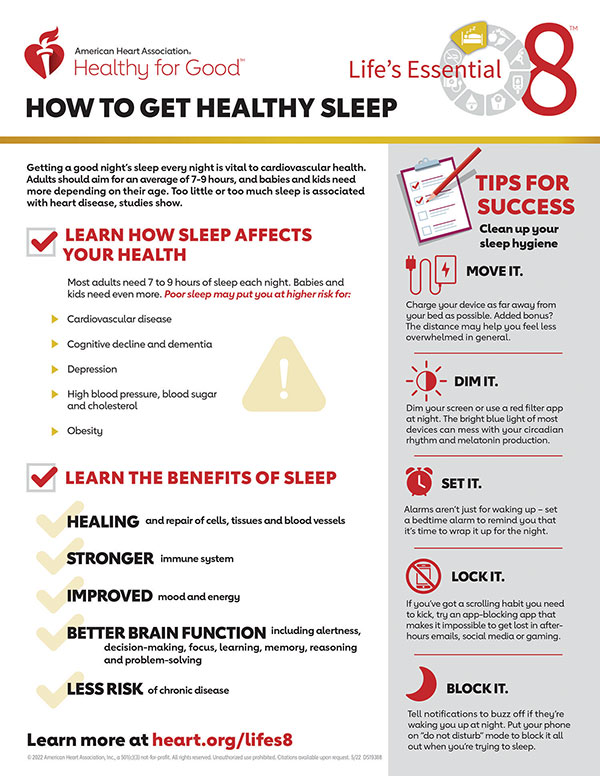(Family Features) There’s more to maintaining a healthy heart than just eating right and exercising regularly. While these practices play an important role in both cardiovascular and overall health and well-being, getting a good night’s sleep is also key.
However, more than 1 in 3 adults in the United States are not getting the recommended 7-9 hours of sleep per night, according to the Centers for Disease Control and Prevention (CDC). In addition to increasing risk for cardiovascular conditions like high blood pressure, heart disease, heart attack and stroke, lack of sleep may also put people at risk of depression, cognitive decline, diabetes and obesity.
“We know that people who get adequate sleep manage other health factors better as well, such as weight, blood sugar and blood pressure,” said Donald M. Lloyd-Jones, M.D., Sc.M., FAHA, past volunteer president of the American Heart Association and chair of the department of preventive medicine, the Eileen M. Foell Professor of Heart Research and professor of preventive medicine, medicine and pediatrics at Northwestern University’s Feinberg School of Medicine. “The American Heart Association added sleep to the list of factors that support optimal cardiovascular health. We call these Life’s Essential 8, and they include: eating a healthy diet, not smoking or vaping, being physically active and getting adequate sleep along with controlling your blood pressure and maintaining healthy levels of cholesterol and lipids, healthy blood sugar levels and a healthy weight.”
Education about healthy heart habits from the American Heart Association is nationally supported by Elevance Health Foundation. Some practices to improve sleep health and impact heart health include:
 Avoid Food and Beverage Close to Bedtime
Avoid Food and Beverage Close to Bedtime
To help reduce sleep disruptions caused by food, avoid late dinners and minimize fatty and spicy foods. Similarly, keep an eye on caffeine intake and avoid it later in the day.
Exercise Regularly
Physical activity can have a noticeable impact on overall health and wellness but can also make it easier to sleep at night. However, exercising too close to bedtime may hinder your body’s ability to settle; aim to have your workout complete at least four hours before bed.
Establish a Bedtime Routine
Getting a good night’s rest often requires getting into a routine. Start by setting an alarm to indicate it’s time to start winding down. Rather than heading straight to bed, create a to-do list for the following day and knock out a few small chores. Then consider implementing a calming activity like meditating, journaling or reading (not on a tablet or smartphone) before drifting off to sleep. Also set an alarm to wake each morning, even on weekends, and avoid hitting the snooze button.
Create a Comfortable Sleep Space
The ideal space for sleeping is dark, quiet and a comfortable temperature, typically around 65 F depending on the individual. Use room-darkening curtains or a sleep mask to block light and ear plugs, a fan or a white noise machine to help drown out distracting noises. Remember, using your bed only for sleep and sex can help establish a strong mental association between your bed and sleep.
Avoid Tech Before Bed
The bright light of televisions, computers and smartphones can mess with your Circadian rhythm and keep you alert when you should be winding down. Try logging off electronic devices at least one hour before bedtime and use the “do not disturb” function to avoid waking up to your phone throughout the night. Better yet, charge devices away from your bed or in another room entirely.
Find more tips to create healthy sleep habits at Heart.org.
Photo courtesy of Getty Images
Categories:
5 Steps to Sleep Better and Improve Heart Health
April 10, 2023
0
Donate to The Tiger
Your donation will support the student journalists of Clemson University. Your contribution will allow us to purchase equipment and cover our annual website hosting costs.
More to Discover








